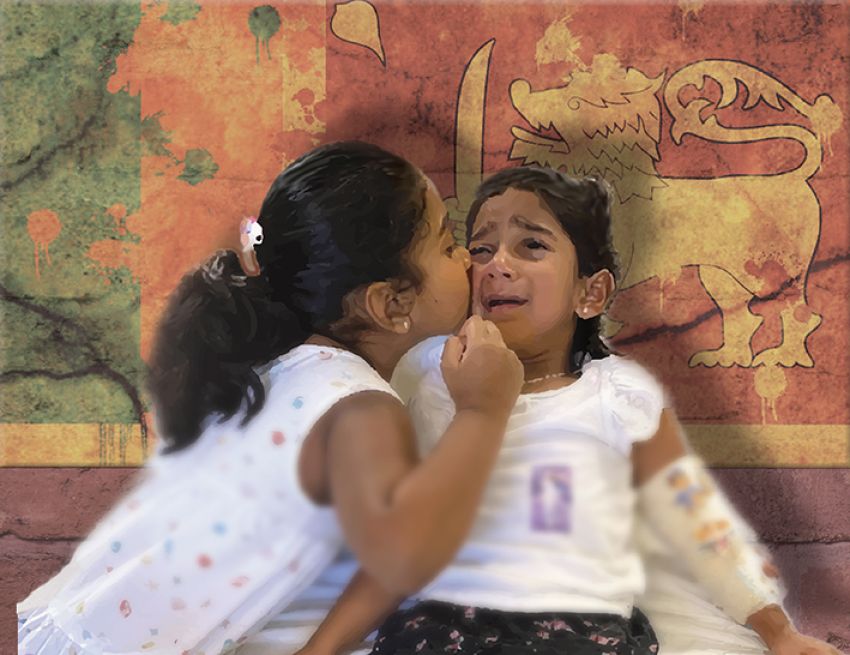
The federal government insists that the Murugappan family can be safely returned to Sri Lanka and that they do not meet the refugee criteria.
Really? A quick glance at recent history suggests otherwise.
In 2009, Sri Lankan government forces of then President Mahinda Rajapaksa carried out their “final solution” to the 26-year civil war waged by the Tamil Tigers against the oppression of the Tamil peoples.
They prepared well — banning all foreign journalists, human rights’ monitors and United Nations observers. Next, they declared a “No Fire Zone” and encouraged between 300,000 and 400,000 Tamil civilians to gather in that zone for their own “safety”.
The armed forces then launched their deadly, sustained and deliberate shelling campaign on this zone, as well as other areas, including hospitals set up for the wounded.
An estimated 40,000-70,000 Tamils were killed. Some credible estimates put the figure at twice this many. It was genocide.
Nades, like many Tamil youth, was recruited during the civil war as a child soldier to the Tamil Tigers.
Before meeting Nades, Priya watched as her previous fiancé was burned alive, along with five other Tamil men.
The persecution of Tamils is ongoing in Sri Lanka. In 2013, former New South Wales Greens Senator Lee Rhiannon was arrested and forced to leave Sri Lanka after meeting with activists there.
One of these was a lawyer who showed her text messages sent by an army commander in the north to Tamil women. They were being systematically raped as “comfort women” by army officers.
The UN Special Rapporteur on counter-terrorism and human rights, following a visit in July 2017, reported the use of torture by Sri Lankan security forces is routine and continues despite the government’s claim to have reformed the security sector.
Human Rights Watch reported in 2018 on the “cruel legacy” of the military occupation encroaching on Tamil civilian life in the North and East of Sri Lanka.
This is a reference to the fact that vast tracts of Tamil land in the North and East of the island had been stolen and handed over to Sinhalese settlers from the South.
Government soldiers and Sinhalese were given land and financial inducements to settle in Tamil lands. They were encouraged to build permanent houses. Meanwhile many Tamil refugees have been prevented from returning to their homes, farms and businesses.
Tamil temples and graveyards have been bulldozed. The Sri Lankan government has a deliberate policy of trying to break up the geographically defined Tamil homeland.
This, by itself, meets the definition of genocide.
In May, the United Kingdom’s Upper Tribunal urged Australia to retract a Department of Foreign Affairs and Trade (DFAT) report that suggested the torture of Tamils is no longer state-sponsored and that Sri Lankans face a low risk of torture overall.
It questioned how the DFAT could have arrived at this conclusion when no sources were identified or cited.
The International Truth and Justice Project and the Australian Centre for International Justice also questioned this conclusion “in the face of overwhelming evidence from independent and verified sources”.
Why is the Coalition so determined to ignore the well-documented evidence of ongoing persecution of the Tamils in Sri Lanka?
Is it only a product of its racist refugee policy that seeks to prevent people seeking asylum in general — which we know contravenes its obligations under international and human rights law — or is something more going on?
There is a second crucial element and that is Australia’s special security relationship with Sri Lanka, a relationship that has deepened since the 1970s when the Indian Ocean gained strategic importance for both countries.
The government views the Indian Ocean as key to its national security in the Asia Pacific region.
In 2013, then Prime Minister Tony Abbot gifted two patrol boats to Sri Lanka to help its navy stop the “evil trade of people smuggling” and “preserve lives at sea”.
In April, the federal government gifted the Sri Lankan police five drones for use in a “wide range of activities” including countering “maritime people smuggling”.
Once again, Human Rights Watch raised concerns. “We have seen increased surveillance in northern areas, which are Tamil majority areas, and seen a lot of activists and victims’ families complaining about visits from security agents, threats and intimidation.”
Whether it is locking up people seeking safety, gifting boats and drones to governments perpetuating human rights abuses or denying asylum to those seeking safety, the Coalition (and Labor when in government) has pursued an obscene policy that is rooted in racism and further fuelled by corporate strategic economic interests.
The Tamil people of Sri Lanka are paying the price.
Green Left supports and promotes campaigns for peace and justice, for the right of asylum seekers to stay and become part of our community.
Become a supporter and get involved in the campaign to support the Murugappan family to return to Biloela in Queensland and, in doing so, support all those seeking asylum to access a path to permanent residency.